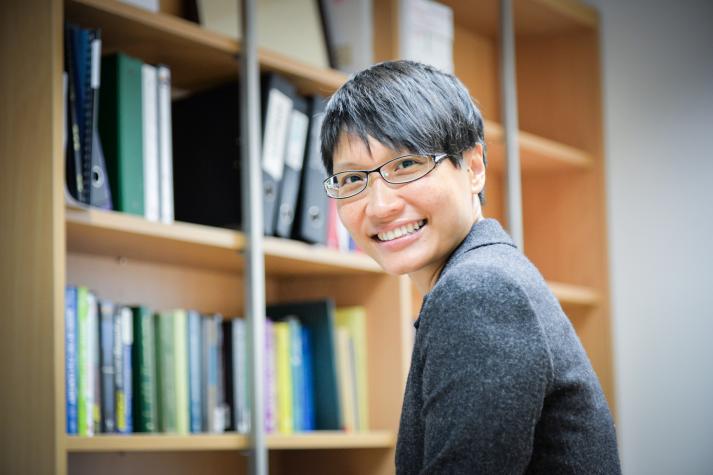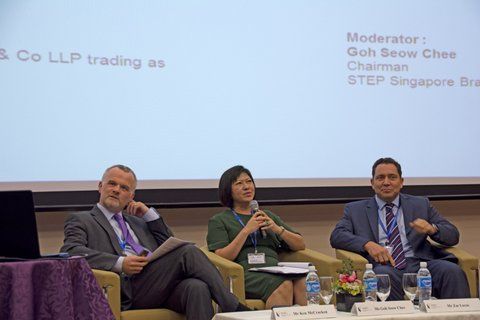
How can employers recruit the most suitable candidates, and how can an individual choose the best career? SMU Assistant Professor Serena Wee’s research points to a way of reaching an optimal solution.

Photo Credit: Cyril Ng
By Rebecca Tan
SMU Office of Research (2 June 2014) – Human resource expenditure is one of the biggest overheads for most companies. From the individual’s perspective, most of their time is spent at the workplace, making job satisfaction a significant determinant of overall well-being. It is imperative then that employers find the right employees, and vice versa.
Assistant Professor Serena Wee of the Singapore Management University (SMU) School of Social Sciences studies how companies and individuals can find the right fit. Her main research interests are personnel recruitment and career decision making.
“In psychology, we have this concept called person-job fit. Organisations want to select the person who best fits the job, and people want to obtain jobs that suit their goals, abilities and interests. The goal is to find the best way to optimise this person-job fit,” she explains.
Optimising for diversity
In particular, Professor Wee looks at how organisations can adopt hiring strategies that ensure multiple criteria are met simultaneously. For example, how a company can hire the best and brightest candidates, and yet also maintain a balanced and diverse staff profile.
“Traditionally, recruiters have tried to optimise just one goal, i.e., selection quality, which cognitive ability tests can measure very well. However, studies have found that the use of cognitive ability tests as a selection criterion results in the recruitment of many more people from one ethnic group over the other,” she says.
“Companies want to have bright people, but they also want to have a diverse group of staff. Diversity is sometimes related to better outcomes in problem solving strategies, marketing strategies and so on; and it is also a legal issue in countries such as the United States.”
In order to help companies meet both goals simultaneously, Professor Wee and her colleagues implemented a differential weighting strategy called Pareto optimality to combine cognitive ability tests.
“By using Pareto-optimal weights, we are able to take into account selection quality as well as diversity outcomes. The weighting strategy is not just to try and get the best applicant in terms of cognitive ability, but also other aspects that a company values.
“We used two large data samples and showed that it was possible to improve diversity outcomes if the Pareto-optimal weighting strategy had been used. We also conducted some simulations to show that this procedure would work well under a variety of circumstances,” she adds.
Professor Wee’s weighting strategy not only allows companies to develop selection systems that meet the legal requirements of diversity quotas, but also enhance their reputation as a progressive recruiter in the eyes of employees and investors, she says. However, what satisfies her the most is knowing that her work could lead to better job opportunities for minority groups.
“The key way for ethnic minorities to get out of poverty is to break the cycle. To do so, better educational and employment opportunities are needed. That’s how, at least in a meritocratic society, we assume people will get to better outcomes in their lives,” she says.
Getting the job you want
Professor Wee’s work not only focuses on the organisation’s perspective, but also examines the processes that drive an individual’s career choices.
“When you ask people what they want to do, they might tell you they want to start their own company or be an artist, but you’ll find that most people don’t actually do these kinds of jobs. There’s a discrepancy between what they say they want to do, and what they actually do. I study the kinds of decisions people make when it comes to choosing a job, especially what happens when people have to make compromises in their career choices,” she says.
Much of the research in this area has focused on the individual’s interests. Although it would be ideal to find a job that is fully aligned with one’s interest, the reality is that compromises often have to be made.
“The major finding in my research is that when people have to choose jobs and make compromises, then instead of just focusing on their interests, they tend to focus on prestige and status. The implications here would be that career counselling strategies would have to take prestige into account.”
Another interesting finding is that people tend to choose jobs within their sex-type when they have to make large compromises. Sex-typed jobs are jobs that are perceived as either more masculine or feminine. This perception typically results in gender imbalances, such as fewer female engineers and male nurses.
“The theory behind this phenomenon is that people’s jobs and their gender are both deeply rooted parts of their identity. Although people tend not to think about it much on a day-to-day basis, they are inclined to choose gender neutral or gender appropriate occupations,” Professor Wee says.
Changing contexts
Professor Wee also notes that job descriptions do not always match what people really do in their jobs. This is because the context of a job may be different depending on the environment, and disruptive technologies may change the economic and social situation at any time. Furthermore, people themselves change over time, and the nature of the work will change, depending on the dynamics of the team to which the individual is assigned.
“At present, the field is not very good with the notion of change. All these different contextual issues need to be incorporated into our understanding of employer recruitment and employee choice. We have been working on this for a while, but more can definitely be done,” she concludes.
See More News
Want to see more of SMU Research?
Sign up for Research@SMU e-newslettter to know more about our research and research-related events!
If you would like to remove yourself from all our mailing list, please visit https://eservices.smu.edu.sg/internet/DNC/Default.aspx

